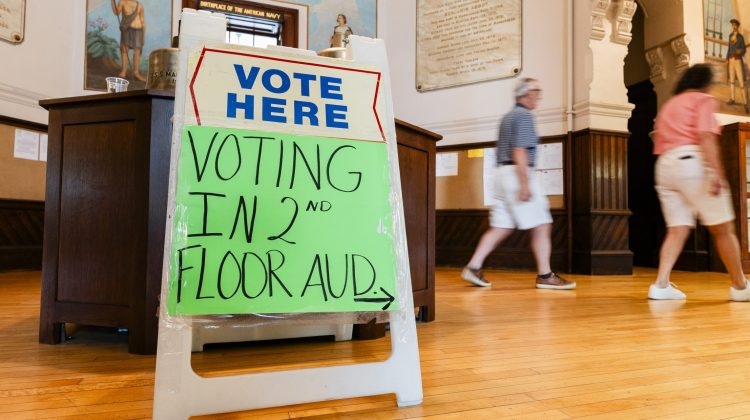MARBLEHEAD —Voters on Tuesday rejected the implementation of 3A zoning, overturning multifamily housing overlay districts approved at the May Town Meeting.
A total of 6,393 of Marblehead’s 16,732 registered voters turned out, defeating the measure 3,642 to 3,297 and surpassing the 3,347 votes needed for repeal. The measure was defeated by a margin of 345 votes.
The outcome repeals zoning changes previously approved at the May 6 Town Meeting and places Marblehead in noncompliance with the Massachusetts Bay Transportation Authority Communities Act ahead of the July 14 state deadline.
The decision will not endorse zoning changes that will allow multifamily housing in three key overlay districts: Pleasant Street, Broughton Road, and Tioga Way.
The referendum, held under Marblehead’s 1954 Special Act, marked the first time in the act’s 71-year history that such a vote was triggered. The measure, known as Article 23, was previously approved at May’s Town Meeting by a vote of 951 to 759.
Supporters emphasized the benefits of the measure: preserving eligibility for state grants, maintaining local control over zoning, creating broader housing options, and supporting the town’s economy.
Opponents of 3A cited Marblehead’s already overcrowded public schools, high population density, and failing infrastructure.
Attorneys Yael Magen and John DiPiano filed the petition that brought the article to a town-wide vote, making use of Marblehead’s unique special act provision.
After the vote was called, Magen and Tim Swigor said they were not surprised the town voted against 3A, but they were equally overjoyed.
Magen said, “I’m very happy for the vote. I think one of the reasons why we did this is that we wanted to make sure that every resident who wanted to vote had the opportunity to vote.”
Swigor said, “We beat it last year at the town meeting twice. And quite frankly, 2200 people showed up on Monday night, and 1700 people showed up on Tuesday night. That’s when we lost the vote. If 2200 people showed up on Tuesday night, I think it would have been defeated again. And that’s when we did the referendum.”
Magen said, “I think tonight’s vote shows that that our leaders, and especially the Select Board, should listen to the voters, because we have asked them to. We repeatedly asked them to file an exemption, to file an exception, to negotiate with the state, which is something that you can do, and they repeatedly refused to do that.
“This shows that the town really did not want 3A to pass, or at least did not want 3A to pass the way that the Select Board wrote it, and that was the reason that I co-sponsored the referendum, because the way that it was written did not benefit the residents. And really, the only people that benefit are developers, real estate agents, etc.,” she said.
A supporter of 3A outside Abbot Hall on Tuesday evening, Karen McMahon, said opposers of 3A do not “totally understand what it means.” She added, “It’s not going to be done immediately, it takes time, and the town doesn’t have the money to fight it.”
Fellow sign holder in front of Abbot Hall, Betty Landergan, said she supports 3A because “it’s already been challenged, and towns have been shot down by the Supreme Court, so the best they could hope for is that it will cost the town a phenomenal amount of money in litigation, and then eventually they’ll still have to do it, and in the meantime, they’ll lose grants, transportation funding, and stuff that the town can really use.”
She added, “It’s very hard to understand the logic of people who are saying ‘No.’ We need more housing in this state. There’s no doubt about that.”
Laura Tamagno, who was holding a ‘Vote No’ sign outside Abbot Hall Tuesday evening, said she is voting no because, “I am committed to preserving Marblehead and I recognize that we are one of the most densely populated towns in the 292 Massachusetts towns.”
Tamagno said 3A will also cause public school overcrowding. “Our schools can’t handle the people we have. They can’t handle the student body now. We don’t, we don’t have enough money or enough people to staff,” she said.
She added that people might confuse 3A with offering affordable housing.
Tamagno said 3A only benefits the developers who want to make money off of the town. “It’s not going to help people, and it’s not going to be affordable. This will be market-rate housing. This is not subsidized housing. If they made housing for townspeople, working people who worked in the town, I’m all for it,” she said.
Kevin Conwell said he voted No on 3A because the town’s infrastructure cannot handle an influx of new residents.
“The infrastructure of this town can barely handle what it’s got. Now we’re not even keeping up on many things. So if you add this, we’re just going to be way over our heads and trying to keep things together,” he said.
He added he feels as though 3A will cause a higher need for first responders.
“We would essentially have to double the size of the fire department and double the police department, and we barely found a way to find the money for the departments.”
The change does not bring Marblehead into compliance with the state’s MBTA Communities Law, which requires cities and towns served by MBTA transit to zone for multifamily housing equal to 10% of their housing inventory. This zoning applies to roughly 1% of Marblehead’s total land area.


